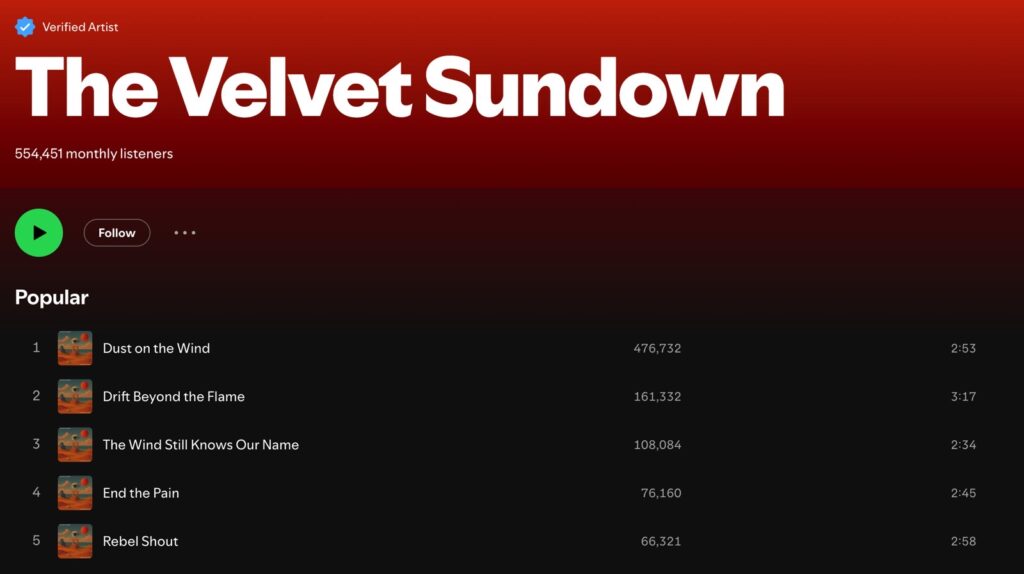In a remarkable twist for the music industry, an AI-generated rock band has amassed over 500,000 monthly listeners on Spotify, raising questions about the role of artificial intelligence in music creation. The band, which does not exist in the traditional sense, has achieved this milestone within just a few weeks, thanks in part to Spotify’s algorithmic recommendations.
The rise of this AI band, which remains unnamed in official Spotify listings, highlights a growing trend where generative AI is not only used for creating text, photos, and videos but also for producing music. This development has sparked discussions about transparency and the need for listeners to be informed when they are consuming AI-generated content.
The Emergence of AI in Music
Generative AI software has been making waves across various creative industries, and music is no exception. By synthesizing speech, background audio, and musical compositions, AI can create tracks that are virtually indistinguishable from those produced by human artists. The AI band’s success on Spotify is a testament to this capability, as it continues to draw in listeners who may be unaware of its artificial origins.
While some artists embrace AI tools to enhance their creativity, there is a growing call for transparency. Many listeners feel that they should be informed if a piece of music has been altered or entirely created by AI, allowing them to make an informed choice about their listening experience.
Social Media Reactions and Industry Implications
Reports of the band’s AI origins surfaced on social media about a week after it joined Spotify, with users warning others about the nature of the music. Despite these warnings, the band’s listener count soared from 300,000 to over 550,000 in a matter of weeks, largely due to Spotify’s algorithmic promotion.
Spotify itself does not label the band as AI-generated, and its artist page even features a “Verified Artist” checkmark. This lack of disclosure has sparked debate about the ethical implications of AI in music and the potential for AI bands to displace human artists in streaming playlists, thereby impacting their revenue.
Comparisons and Historical Context
The phenomenon of AI-generated music is not entirely new. In a recent episode of his show, John Oliver discussed the concept of “AI slop,” which includes AI bands that have produced numerous albums in a short span of time. These bands often share thematic elements, such as references to “dust” and “wind,” suggesting they may be created using similar AI models.
Historically, the music industry has seen technological disruptions, from the advent of electronic music to the rise of digital streaming. However, the introduction of AI-generated music presents unique challenges and opportunities, prompting discussions about copyright, creativity, and the future of human artistry.
Looking Ahead: The Future of AI in Music
As AI continues to evolve, its role in music creation is likely to expand. While some listeners may embrace AI-generated music for its novelty and innovation, others may prefer traditional human artistry. The key lies in transparency and choice, ensuring that listeners are aware of what they are consuming.
For now, the AI band plans to release a third album soon, further cementing its presence in the music streaming landscape. Whether AI bands will become a staple in the industry or remain a niche curiosity is yet to be seen, but their impact on the music world is undeniable.
About The Author
 How AI Could Pave the Way for a Four-Day Work Week Revolution
How AI Could Pave the Way for a Four-Day Work Week Revolution World’s Largest Digital Camera Captures Stunning Space Images
World’s Largest Digital Camera Captures Stunning Space Images Nothing Phone 3: A Bold New Contender in the 2025 Flagship Arena
Nothing Phone 3: A Bold New Contender in the 2025 Flagship Arena Nothing Unveils Headphone 1: A Bold $300 Contender to AirPods Max
Nothing Unveils Headphone 1: A Bold $300 Contender to AirPods Max New MRI Tool Predicts Aging Speed and Dementia Risk
New MRI Tool Predicts Aging Speed and Dementia Risk